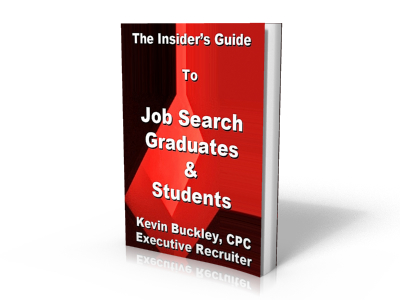The Insider's Guide To Job Search
Student Resources return
to Table of Contents
![]() Updated: 01.02.2015
Updated: 01.02.2015
 You can click this image to download the free pdf or ePub book.
You can click this image to download the free pdf or ePub book.
Just added: http://associatesdegrees.com - An online resource guide to associate degrees programs across the USA
Newest Resources: To determine the value of your
degree and the job paths related, see this excellent
section of McMaster university's website for various degrees obtained:
Site of the Week:
BrainTrack -- Profiles and school listings for over 400 occupations that commonly require higher education for entry or advancement.
Student Resources -
click here for the Quick
Reference Tips for New Graduates
The following information provides Tips on Self-Marketing and outlines
the various directories, associations, publications and other resources
available for review in making direct approaches to potential employers.
Progressive employers view talented graduates as a valuable resource for future growth. They often have co-op placement programs and from these temporary placements, they determine which candidates to keep in mind for future hiring.
Tips on Self-Marketing -
Please note that some links will take you to articles we have
published in our main site. Hit your back button to return to this page.
Changing the Student's Perspective:
The business world and the student world are two different realities.
As a student, you acquire knowledge, in the business world you learn how best to
apply it for productive results. Changing how you see yourself is important to
market yourself effectively. You are your own ambassador. You want to think in
entrepreneurial terms: How can I create buyer interest in my skills
and knowledge? This means dressing differently, speaking
differently and keeping foremost in mind that you are marketing the person that
you are - your personality strengths, your enthusiasm, your values, your
willingness to be a teamplayer.
Personal Presentation:
You can never go wrong dressing in standard business attire. Avoid very
casual clothes, stay with the basic blues, greys and browns for suits. For
females, the classic look is the skirt and blazer combination. You want the
interviewer to be interested in you, not distracted by unusual ties or colour
combinations. Naturally, good personal hygiene and grooming are expected.
Gather your Resources:
Review the publications and on-line resources which follow these Tips
and make a list of the telephone numbers and email addresses of the intended
recipients of your resume.
Do Research on the Internet:
To obtain executives names and contact information visit the websites of
companies and click on their 'Contacts' page. See the
Resumes
Article from our main site for more
details on obtaining information and using search engines.
Concentrate on those Companies who can utilize your Experience:
Approach those companies which are active in trade-lanes which you
are interested in - forwarders, steamship companies, importers/exporters,
trading companies. If you have a second language, that expertise may be useful
to companies active in related trade-lanes.
Check the Yellow Pages for Bi-lateral Trade Commissions and Chambers
of Commerce:
Find out if there is a local Chamber of Commerce or Trade Commission for
bi-lateral trade between Canada and your home country if you are recently
arrived in Canada. See page 1324 in the Toronto Central-East Yellow Pages for a
listing. See pages 105 and 106 under 'Associations' for additional Chambers of
Commerce and bi-cultural organizations. Sometimes these
organizations will be aware of native-language newspapers or job-board resources
which you can investigate.
Make sure your Resume is error-free:
If English is your second language, have it reviewed by someone who is
fluent in english to ensure that the text is clear and there are no mistakes in
spelling, grammar or sentence structure. The same applies to any cover letter
which you might wish to include. Also, if you have an email address, be sure to
note this on the resume for people to follow up with you. Anyone can open a
Hotmail or Yahoo email account for personal use. See the
Resumes/Cover Letters
articles for
more information.
Send your Resume to the right Hiring Authority:
If your background is sales & marketing, send your resume to the Sales
Manager or Director of Sales. If your background is operations, send it to the
Operations Manager, and so on. For the best result, send your resume to the
person who would logically be involved in making a hiring decision for your
experience level.
Research and verify the Spelling of the Hiring Authority's name:
It is more effective to send your resume to an actual person rather than a
position title. We strongly recommend that you take the time to research the
right name of the intended recipient of your resume.
Make your Email message brief:
Busy executives dislike having to scroll through a long email message to get to
the core of it. State your objective clearly and briefly in a few words. Make
sure the Subject header clearly expresses your objective. Do not expect to get a
response, state your intention to follow up with a telephone call. This way you
can choose and prepare for a follow up call.
Ask for the Executive's opinion of your experience:
People like to give their opinions. Rather than request a meeting,
ask for the recipient's comments on your resume and experience when you call
them back. Asking to set up a meeting without having established a basis for
interest is usually not very productive. Call back within about 48 hours after
having sent an email. Calling back immediately after sending it may not allow
the recipient enough time to read it.
Follow up with a Thank-you letter or card:
Showing your appreciation for someone's time or guidance is an excellent way of
developing positive contacts in your job-search.
Interviewing Tips: See the
Being Interviewed
page for detailed information. Also
Recruiters
for tips on how to work with recruiters and what
their expectations are.
Keeping the Job you Get:
Getting a job is an accomplishment, keeping the job you get requires different
skills. Within the corporate world it is vital to interact positively with
people, be a teamplayer, have a teachable attitude and concentrate on building
working relationships both inside and outside of your employer. Technical
competence is important but gaining the cooperation of other people leads to
mutually rewarding achievements. Leadership is learned and it begins with
knowing your strengths and weaknesses and how to apply these from a foundation
of strong personal values and principles. See
Self-Assessment
for
more information on taking personal inventory at any stage of
your career.
Maze Master
has
an excellent self-assessment series of exercises in taking personal inventory.
 click image to access Table of
Contents page
click image to access Table of
Contents page
| Self-Assessment - points to consider when you are looking to change jobs or take a new direction | Resignations - tendering your resignation so that you retain goodwill and seal your decision | A Guide to Successful Interviewing - extensive guidance on interviewing techniques and styles |
| Criminal Background Checks - make sure you know what is on your record to not be blindsided by past indiscretions | Counter-Offers - how short-term compromises can result in unwanted consequences | What's On Your Social Media Profile? - ensure there is nothing on your profile/s that negatively impact your chances |
| How To Stand Out From The Competition - preparation and clarity in communicating are essential to make the right impact | Recruiters - What to Look For - signs to look for in selecting a recruiter to represent you, especially if you are currently employed | Negotiating Compensation - determing what is important to you in negotiating your total package of compensation and benefits |
| Promotions - who gets promoted and why it isn't just how well you do your job that counts but also how you form strong relationships | Job Boards & Internet Postings - tips on using job board postings effectively as a search tool, a handy resource that works for you 24/7 | Assessing Potential Employers - points to consider in deciding if this is the right place for you to commit your time and energy to |
| Being Downsized - dealing with the shock of a termination and rising to the challenge it presents | Making Contact Using the Internet - using web resources to identify potential hiring managers | Questions to Ask Potential Employers - questions to determine performance expectations |
| Job Satisfaction - defining what job satisfaction means to you and your sense of self-motivation | E-Resumes - What Works Best - guidance on using e-resumes to their best benefit | For Recent Graduates - tips on self-marketing for recent Transportation program graduates |
| Overcoming Inertia - asking yourself the questions you need to move forward in your career | Your Resume - Your Career Passport - constructing a resume that represents you well | Tips For Using LinkedIn Profiles - from your profile picture to networking with Group members |
| Step-by-Step Self Marketing Plan - walks you through a systematic approach to job search | Cover Letters - Brief and Focused - getting to the point in telling employers what you can do | Newcomers Job Search Resources - extensive links and resources for Newcomers to Toronto |
Please note that the sites suggested for review are for information purposes
only. We receive no fees from these recommendations.